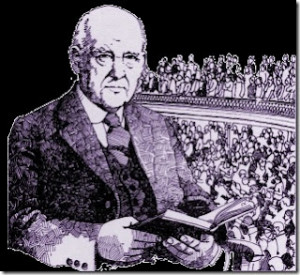Listen to the original sermon who first trusted in Christ. In whom ye also trusted, after that ye heard the word of truth, the gospel of your salvation: in whom also after that ye believed, ye were sealed with that holy Spirit of promise, which is the earnest of our inheritance until the redemption of the purchased possession, unto the praise of his glory.’ – Ephesians 1:11–14
We continue our discussion of the Apostle’s great statement. He has announced that the great secret which God has revealed concerning His purpose is that in this present age, and in Christ, He has reunited the discordant parts, the separate parts, into which sin has divided the world and the whole cosmos. God is restoring the original harmony, in heaven and on earth, and He is doing so in and through our Lord Jesus Christ. In the dispensation of the fulness of times it is His purpose that He might ‘gather together in one all things in Christ, both which are in heaven and which are on earth, even in him.’ In these verses we are considering the ways in which God is doing this, and have already given attention to the first, and indeed in many senses the chief way, namely, the formation and the growth of the Christian Church. The Church is the new Israel, the spiritual Israel, the true seed of Abraham, and she consists of Jews and Gentiles. But the unity is established, as we have seen, by making these different people Christians, and the Apostle incidentally tells us a number of things about the Christian. We have already considered two of them.
Now we come to consider, in the third place, the way in which all this has happened to us, how this has ever become true of us, knowing ourselves as we do. How does anyone become a Christian? How does anyone enter into this position in which he is ‘in Christ’ and a ‘joint-heir’ with Christ? Fortunately the Apostle deals with that subject also. He is not content with saying that this is true of us, he tells us how it has become true. And he does so, of course, because this was something at which he never ceased to wonder. As we proceed we find Paul using a number of terms which we have already encountered. We met them in verses 4 and 5. They include certain great terms and phrases which are to be found throughout the New Testament, terms which are absolutely essential to a true and ultimate understanding of the Gospel: ‘In whom also we have obtained an inheritance, being predestinated according to the purpose of him who worketh all things after the counsel of his own will.’ In verses 4 and 5 we find: ‘According as he hath chosen us in him before the foundation of the world, that we should be holy and without blame before him in love: having predestinated us unto the adoption of children by Jesus Christ to himself.’ Such are the terms. We are here face to face with high doctrine, with some of the great profundities of the Christian faith and the Christian messages. Someone may ask: Why does the Apostle repeat these terms here, having already used them in verses 4 and 5? The explanation is not only simple but very important. In verses 4 and 5 the Apostle was taking a general view of God’s purpose, he was looking at it, as it were, from that eternal standpoint. Now he is not merely looking at it in general, but also in its particular application to us. There, it was the great scheme itself; here, it is the scheme as applied to us. But he still uses the same terms as he used there. They apply not only to the thought but also to the application.
Many Christian people never study these terms, never dwell on them, never turn them over in their minds. Let me prove that contention by asking a question. How often have you heard anyone going slowly, and term by term, through this great chapter? Or, how often have you read them yourself in this way? Are we not in danger of avoiding these great terms because of certain associations which they have? This is something of which we, as Christian people, need to be very wary at this present hour, for certain aspects of New Testament truth are just not being considered at all because of an element of controversy attached to them. Large numbers of Christian people are totally ignorant of prophetic truth, for instance, because their attitude to it is determined by the fact that it leads to argument and wrangling about various theories. They imagine that that is a wise and sound position to take up. But what they are actually doing is deliberately to ignore God’s Word; they are deliberately by-passing certain aspects and elements of God’s revealed Truth. God means us to study and to face everything in His word whether it is difficult or simple, whether involved in controversy of otherwise. To say ‘peace at any price’ at the expense of God’s revealed truth is surely an insult to God. These matters have to be faced, whether it is the truth concerning prophecy of whether it be the truth concerning these high matters of doctrine which the Apostle puts before us in these verses, as he has already done in verses 4 and 5. Continue reading

